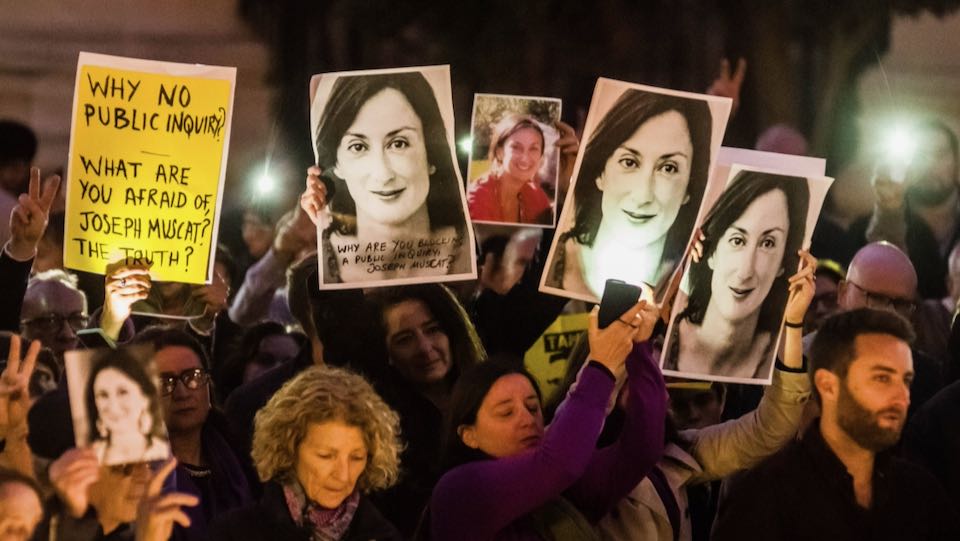Malta: Perpetrator sentenced to 40 years in prison for murder of journalist

On Friday, after a guilty plea on the first day of the trial, a court in Malta’s capital Valletta sentenced brothers Alfred and George Degiorgio to 40 years in prison for murder. They are accused of killing investigative journalist Daphne Caruana Galizia with the help of a car bomb.
Galizia died on October 16, 2017. Her car exploded shortly after she left home. She had made a series of corruption allegations against prominent figures, including ministers in the government at the time.
The Degiorgio brothers had already been arrested as suspects in December 2017. Approximately 100 witnesses were scheduled to be heard in the case, and a jury verdict was to be rendered. The defendants negotiated their current prison sentence in a settlement, according to Reporters Without Borders (RSF) on Saturday. Without it, they would have faced life sentences.
At the scene, journalists’ organizations RSF, Committee to Protect Journalists (CPJ) and Article 19, among others, had been monitoring the trial. RSF called the start of the trial a “long overdue step” but welcomed the sentencing. Pavol Szalai, head of RSF’s EU and Balkans desk, said, “Nearly five years on [after the murder], it’s more important than ever to ensure that full criminal justice is delivered for all those involved in this heinous crime.”
The European Center for Press and Media Freedom sees the trial as “a historic opportunity” for the Maltese government to fulfill its obligations to better protect journalists under the law. “The lack of political will to initiate the necessary effective and systemic reform casts doubt on whether Malta’s political class has learned lessons from the murder of Caruana Galizia,” the organization warned.
Parties involved
At the start of the trial Friday morning, the defendants had still denied all six charges. After an extended lunch break, the brothers were to present their pleas again, whereupon they unexpectedly pled guilty, The Guardian reported.
In addition to the prison sentence, the Degiorgio brothers were ordered to pay 42,930 Euros each in court costs and 50,000 Euros each, which they had received as payment for the murder. Earlier, the defendants had tried unsuccessfully to negotiate a pardon in exchange for naming other co-conspirators. These were said to include a former minister, but his identity was not disclosed.
With the brothers, three of a total of seven men accused of conspiring to commit the murder have now been convicted:
Accomplice Vincent Muscat had already changed his plea to guilty in February 2021, escaping trial. He was sentenced to 15 years in prison and to pay court costs of 42,000 Euros, in part because he had planted the bomb under the car. His sentence was reportedly reduced after he provided information to prosecutors about others involved in the case. In another murder case, Muscat had already been pardoned by President George Vella. He had provided information on the 2015 murder of lawyer Carmel Chircop.
The influential Maltese businessman Yorgen Fenech is being charged separately from the other cases. Prosecutors accuse him of paying the contract killers and inciting them to commit the crime. He maintains connections in government circles and has so far pled not guilty to all charges. A date for his trial to begin has not yet been set.
The trial of two men allegedly involved in the murder, Jamie Vella and Robert Agius, has also not yet begun. They are alleged to have supplied the bomb used.
Far-reaching consequences
In connection with the murder, Malta’s then Prime Minister Joseph Muscat, among others, had resigned in 2020. Prior to that, people had repeatedly taken to the streets to demonstrate against Muscat and demand his resignation. He was accused of corruption in various cases. Before that, the chief of staff, the minister of economy and the minister of tourism of the then Cabinet had already resigned from their posts.
RSF announced that it would continue to press for clarification in the case of the murdered journalist. Executive Director Christian Mihr said, “Far too many cases of murders of journalists have been committed with impunity, but when justice is secured, it sends a clear signal that such heinous violent crimes against journalists will not be tolerated. We will continue to closely follow all legal proceedings in this case and advocate for the wider press freedom reforms still urgently needed to ensure this can never happen again, in Malta or anywhere.”
On RSF’s press freedom rankings, Malta is ranked 78th out of 180 countries. The organization had downgraded the country by 31 places following the murder of Daphne Caruana Galizia in 2017. (hcz)